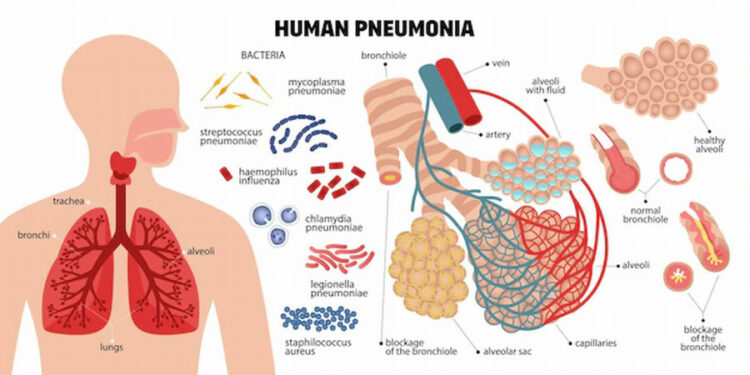Pneumonia is a condition in which the lung tissues become filled with pus, causing respiratory problems. Pneumonia can be caused by a range of different bacteria and viruses, making it very contagious. If one person has it, they have a risk of being exposed to it if they’re around other people as well. As such, anyone who knows someone who has contracted the virus should take appropriate precautions to prevent contracting it themselves as well.
This article will discuss some of the signs that someone may be infected with pneumonia, it will tell you whether pneumonia is contagious or not, and how you can tell if you may have contracted it from another person or animal.
What is pneumonia?
Pneumonia is an infection of the lungs caused by a variety of different germs, including bacteria, viruses, and fungal spores. When someone has pneumonia, they have an inflammation of the alveoli, the tiny air sacs that are responsible for oxygen intake by the body. This inflammation can lead to fluid build-up in the lungs, making breathing more difficult and painful. Pneumonia can be caused by a range of different bacteria and viruses, making it very contagious. If one person has it, they have a risk of being exposed to it if they’re around other people as well.
Signs and symptoms of pneumonia
The signs and symptoms of pneumonia can be very similar to those of other infections and medical conditions. As such, it’s important to talk to your doctor if you notice any of these signs and symptoms, as they could be a sign that you have pneumonia as well.
- Chest pain – This is often described as a tight or squeezing feeling in the chest, which can be accompanied by coughing. Chest pain is not associated with breathing difficulties, however, and so should be taken seriously only if it occurs with regularity.
- High fever – Someone with pneumonia commonly has a high fever, especially if they’re also coughing a lot.
- Shortness of breath – This can manifest as a persistent effort to breathe and a need to sit up while breathing into a paper bag, or even a cough that causes someone to cough up excess phlegm.
- Weakness – Perhaps most important are the signs of weakness – an inability to walk or stand, especially when coughing.
How to tell if you have pneumonia
There are a few easy ways to tell if you have pneumonia. The easiest is to just take a quick sniff of your own breath – with a persistent fever, you should notice a foul smell. In addition, if you have any of the above signs, you may also experience any or all of the following:
- Difficulty breathing – This is perhaps the most obvious sign of pneumonia, as you’ll be breathing with difficulty in and out of bed. You may be breathing so shallowly that you feel short of breath.
- Weight loss – You may notice that you aren’t eating as much as usual, and that you’re losing weight. This is a normal side effect of treatment, which can vary according to the person’s condition.
Prevention tips for pneumonia
If you notice any of the above signs and symptoms, you should seek medical attention as soon as possible. The sooner you receive treatment, the better your chances of recovering. While pneumonia can be deadly, there are a few things that you can do to avoid catching it. These include washing your hands frequently, avoiding crowded places, and staying away from sick people.
Conclusion
Pneumonia is a serious condition caused by a range of different germs, including bacteria, viruses, and fungi. You can get it from other people and even animals, and it can be life-threatening. If you notice anyone who has it, you should take precautions to prevent yourself from contracting it too.
